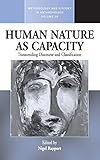Human Nature as Capacity : Transcending Discourse and Classification / ed. by Nigel Rapport.
Material type: TextSeries: Methodology & History in Anthropology ; 20Publisher: New York ; Oxford : Berghahn Books, [2010]Copyright date: ©2010Description: 1 online resource (224 p.)Content type:
TextSeries: Methodology & History in Anthropology ; 20Publisher: New York ; Oxford : Berghahn Books, [2010]Copyright date: ©2010Description: 1 online resource (224 p.)Content type: - 9781845456375
- 9781845458157
- 301.01 22/eng
- GN33
- online - DeGruyter
| Item type | Current library | Call number | URL | Status | Notes | Barcode | |
|---|---|---|---|---|---|---|---|
 eBook
eBook
|
Biblioteca "Angelicum" Pont. Univ. S.Tommaso d'Aquino Nuvola online | online - DeGruyter (Browse shelf(Opens below)) | Online access | Not for loan (Accesso limitato) | Accesso per gli utenti autorizzati / Access for authorized users | (dgr)9781845458157 |
Frontmatter -- Contents -- List of Illustrations -- List of Contributors -- Introduction: Human Capacity as an Exceeding, a Going Beyond -- Part I: Beyond the Economy -- Introduction to Part I -- 1. Conversations with Eulogio: On Migration and the Building of a Life-Project in Motion -- 2. The Limits of Liminality: Capacities for Change and Transition among Student Travellers -- Part II: Beyond the Polity -- Introduction to Part II -- 3. ‘Crisis’: On the Limits of European Integration and Identity in Northern Ireland -- 4. Making the Cosmopolitan Plea: Harold Oram’s International Fund-raising in the Early Cold War -- Part III: Beyond the Classificatory -- Introduction to Part III -- 5. Money, Materiality and Imagination: Life on the Other Side of Value -- 6. Acts of Entification: The Emergence of Thinghood in Social Life -- Part IV: Beyond the Body -- Introduction to Part IV -- 7. Embodied Cognition, Communication and the Making of Place and Identity: Reflections on Fieldwork with Masons -- 8. ‘Live in Fragments no Longer’: Social Dance and Individual Imagination in Human Nature -- Index
restricted access online access with authorization star
http://purl.org/coar/access_right/c_16ec
What is it to be human? What are our specifically human attributes, our capacities and liabilities? Such questions gave birth to anthropology as an Enlightenment science. This book argues that it is again appropriate to bring “the human” to the fore, to reclaim the singularity of the word as central to the anthropological endeavor, not on the basis of the substance of a human nature – “To be human is to act like this and react like this, to feel this and want this” – but in terms of species-wide capacities: capabilities for action and imagination, liabilities for suffering and cruelty. The contributors approach “the human” with an awareness of these complexities and particularities, rendering this volume unique in its ability to build on anthropology’s ethnographic expertise.
Mode of access: Internet via World Wide Web.
In English.
Description based on online resource; title from PDF title page (publisher's Web site, viewed 25. Jun 2024)


